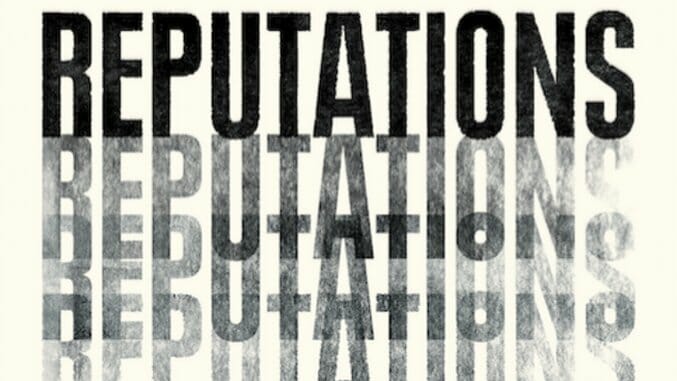Introducing Endless Mode: A New Games & Anime Site from Paste
“That is one last thing to remember: writers are always selling somebody out.”—Joan Didion
Didion’s words also ring true for artists, musicians, playwrights … anyone, really, whose creativity is driven by experience. Memory is fungible, delicate as spun sugar and devoured or dissolved just as quickly; history is less so, requiring many tongues to remove a statue.
Juan Gabriel Vásquez’s novel Reputations concerns itself with the public space we inhabit between memory and reality. Its protagonist, Javier Mallarino, proves to be a legendary political cartoonist, capable of bending the Colombian people’s political will with simple, black-bordered squares. Careers rise and fall on his caricatures, potent homunculi with the simple exaggerations—ears, perhaps, or a distinct bite—and inherent power of icons or voodoo dolls. In gathering the swirling mess of the day into tidy panels and pithy lines, Mallarino crystalizes memory into history; his visions become the people’s, regardless of their accuracy.
 We meet Mallarino at a gala celebrating his brilliant eye and gifted history. A chance meeting at the party leads Mallarino to dissect the events that catalyzed his hegemony—a drunken night 28 years ago immortalized in a cartoon, which may have destroyed a congressman’s career.
We meet Mallarino at a gala celebrating his brilliant eye and gifted history. A chance meeting at the party leads Mallarino to dissect the events that catalyzed his hegemony—a drunken night 28 years ago immortalized in a cartoon, which may have destroyed a congressman’s career.
Reputations is not quite a repudiation of the media’s power to suck the marrow from others. But by bringing Mallarino to a savage collision with the moment that afforded the cartoonist his prominence, Vásquez warns of the fragility inherent in such power. He’s calling into question whether the powers given to us—both by others and, perhaps more importantly, by ourselves—can ever come from a place of true honesty.
Translated from Spanish by Anne McLean, Vásquez’s viperine prose couches venom. A particularly exquisite device is the use of a caricaturist’s eyes, as Vásquez reduces people to features and details, paradoxically flattening them and giving them irrevocable shape. This frequent and arresting occurrence becomes all the more so when Mallarino allows doubt to creep in; as his foundation turns to sand, so does ours.
Nowhere does Vásquez embody the delicate relationship between memory, history, public opinion and power more than in the arc of the book itself. Seen from almost three decades distance, the congressman’s fate and the caricature at the center of it has come and gone. A moment that briefly shook a government is experienced as a personal aftershock, a minimization more powerful for its candidness and intimacy.
The effect is something like a political cartoon.
B. David Zarley is a freelance journalist, essayis, and book/art critic based in Chicago. A former book critic for The Myrtle Beach Sun News, his work can be seen in Hazlitt, Sports Illustrated, The Chicago Reader, VICE Sports, The Creators Project, Sports on Earth and New American Paintings, among numerous other publications. You can find him on Twitter or at his website.

 We meet Mallarino at a gala celebrating his brilliant eye and gifted history. A chance meeting at the party leads Mallarino to dissect the events that catalyzed his hegemony—a drunken night 28 years ago immortalized in a cartoon, which may have destroyed a congressman’s career.
We meet Mallarino at a gala celebrating his brilliant eye and gifted history. A chance meeting at the party leads Mallarino to dissect the events that catalyzed his hegemony—a drunken night 28 years ago immortalized in a cartoon, which may have destroyed a congressman’s career.